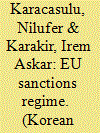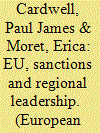|
|
|
Sort Order |
|
|
|
Items / Page
|
|
|
|
|
|
|
| Srl | Item |
| 1 |
ID:
134081


|
|
|
|
|
| Publication |
2014.
|
| Summary/Abstract |
Although there is enormous discussion on normative power Europe, there is relatively less focus on the EU sanctions regime, though sanctions have become a useful foreign policy tool as the EU has applied sanctions within the framework of the Common Foreign and Security Policy. Looking at the literature, Kreutz focused on the EU sanctions regime in the time period of 1981-2004, during which sanctions
were used to accomplish normative goals. Yet, later on Brummer argued that although norms and values still play a role in the EU's sanctions regime, more often they were surpassed by security and economic interests. This article examines the previous work on the EU sanctions regime and tries to comprehend why the use of sanctions has increased over time as well as whether they have been "selectively" used. In addition, the article analyzes whether the normative commitment is crucial in the construction of the EU sanctions regime. The EU sanctions regime toward Iran is analyzed in particular, because as indicated by Santini and Tabrizi, Iran is the first country against which the EU has developed a new strategy out of weapons of mass destruction concerns, starting in 2006. Since 2010, EU foreign ministers have adopted tougher sanctions in an effort to block its controversial nuclear program. Recently, the Iran nuclear deal of November 2013 was interpreted as attributable to sanctions against Iran, in which EU sanctions have constituted a remarkable role, have proven effective.
|
|
|
|
|
|
|
|
|
|
|
|
|
|
|
|
| 2 |
ID:
190056


|
|
|
|
|
| Summary/Abstract |
Sanctions have become the “go to” mechanism for addressing foreign and security challenges in the international arena. The European Union’s willingness to impose autonomous (or unilateral) restrictive measures on third countries, and in particular on Russia, has come to the fore at a time when the uptake of new sanctions through the United Nations (UN) framework has stalled. This trend appears to reflect a growing ability to forge consensus among the EU's Member States and use its economic power to support its foreign policy goals. This article considers the extent to which the EU has succeeded in forging a leadership role in sanctions for itself among non-EU states. It examines the alignment or adoption by non-Member States with its sanctions regimes and finds that the EU has a demonstrable claim to regional, if not yet global, leadership.
|
|
|
|
|
|
|
|
|
|
|
|
|
|
|
|
| 3 |
ID:
189283


|
|
|
|
|
| Summary/Abstract |
The emergence of the COVID-19 pandemic brought about a myriad of responses on the global, regional and national levels. One of the widely adopted measures of dealing with the scourge was the crafting of stringent regulatory frameworks to curtail the spreading of the virus through restriction of citizens’ movement. The role of the police services and, importantly, the military, came under spotlight, as they were instrumental in enforcing COVID-19 containment-related laws. The confinement of people to their homes, as well as the enforcement of the restrictive regulations, led to a paradigm shift in the crime trends. More often, the police and the military had to contend with allegations of various criminal activities and human rights violations. In this paper, which was based on a documentary survey, we discuss the policing environment during the COVID-19 era. We focus on how the COVID-19 era has altered the criminal environment, focusing on criminal activities by both the public and the law enforcement agents. We also explore the human rights implications of the enforcement of COVID-19 containment regulations.
|
|
|
|
|
|
|
|
|
|
|
|
|
|
|
|
| 4 |
ID:
178611


|
|
|
|
|
| Summary/Abstract |
The decisions to impose sanctions on Russia and to lift them on Iran, in opposition to the wishes of the United States, contributed to the elevation of the profile of the European Union among the main global actors in international politics. However, the EU imposes sanctions since the spring of 1994, shortly after the entry into force of the Treaty of Maastricht. Even though the EU consequently has 26 years of experience herewith, EU sanctions have been mostly studied only on a case-by-case basis. The aim of this article is to provide an up-to-date and comprehensive overview of the experience of the EU with sanctions. Specifically, it presents the results of a newly constructed database of EU autonomous sanctions constituted by 48 cases of these restrictive measures, which have been subdivided in 85 episodes. The analysis revolves around four questions that we asked in each case: when sanctions were in force, what type(s) were used, where the targets were located and why restrictive measures were imposed. The analysis of the empirical database leads to observations about the EU as an international actor and, more generally, on the trends vis-à-vis the utilisation of sanctions as a foreign policy instrument.
|
|
|
|
|
|
|
|
|
|
|
|
|
|
|
|
|
|
|
|
|